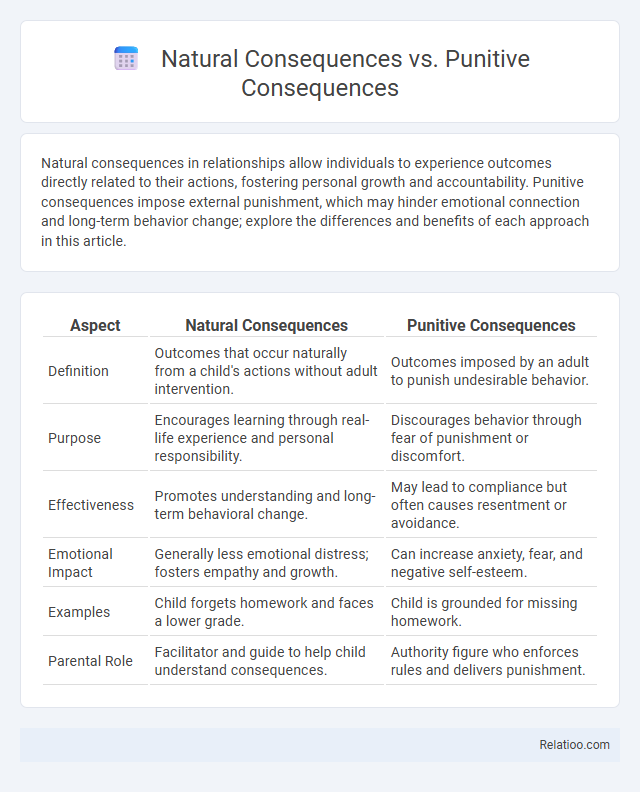Natural consequences in relationships allow individuals to experience outcomes directly related to their actions, fostering personal growth and accountability. Punitive consequences impose external punishment, which may hinder emotional connection and long-term behavior change; explore the differences and benefits of each approach in this article.
Table of Comparison
| Aspect | Natural Consequences | Punitive Consequences |
|---|---|---|
| Definition | Outcomes that occur naturally from a child's actions without adult intervention. | Outcomes imposed by an adult to punish undesirable behavior. |
| Purpose | Encourages learning through real-life experience and personal responsibility. | Discourages behavior through fear of punishment or discomfort. |
| Effectiveness | Promotes understanding and long-term behavioral change. | May lead to compliance but often causes resentment or avoidance. |
| Emotional Impact | Generally less emotional distress; fosters empathy and growth. | Can increase anxiety, fear, and negative self-esteem. |
| Examples | Child forgets homework and faces a lower grade. | Child is grounded for missing homework. |
| Parental Role | Facilitator and guide to help child understand consequences. | Authority figure who enforces rules and delivers punishment. |
Understanding Natural Consequences
Natural consequences occur as a direct result of actions, allowing you to learn from real-life outcomes without external interference. Unlike punitive consequences or punishment, which involve imposed penalties to enforce behavior, natural consequences foster personal responsibility and intrinsic motivation for change. Understanding natural consequences helps you develop cause-and-effect awareness essential for long-term behavioral growth.
Defining Punitive Consequences
Punitive consequences are deliberate actions imposed to discourage undesirable behavior by introducing discomfort or penalties, differentiating them from natural consequences, which occur without intervention, and punishment, which broadly includes any penalty or negative feedback. Your understanding of punitive consequences is crucial for implementing strategies that aim to modify behavior through structured responses rather than passive outcomes. These consequences emphasize control and deterrence, often used in educational or disciplinary contexts to reinforce rules and expectations.
Key Differences Between Natural and Punitive Consequences
Natural consequences occur as a direct result of a child's actions without external intervention, promoting learning through real-life experiences. Punitive consequences involve imposed penalties or punishments designed to deter unwanted behavior, often disconnected from the natural outcome. The key difference lies in natural consequences fostering intrinsic understanding, whereas punitive consequences rely on external control and authority.
Psychological Impact on Children
Natural consequences allow children to experience the direct results of their actions, fostering problem-solving skills and intrinsic motivation. Punitive consequences, often perceived as controlling or harsh, can lead to increased anxiety, fear, and resistance, potentially damaging the child's self-esteem and trust in caregivers. Punishment, especially when inconsistent or excessive, risks creating negative psychological effects such as feelings of shame, aggression, and impaired emotional regulation in children.
Effectiveness in Behavior Change
Natural consequences occur when individuals experience the direct result of their actions, fostering intrinsic learning and long-term behavior change by promoting personal responsibility. Punitive consequences involve external penalties intended to discourage undesired behaviors but often lead to resistance or short-term compliance without internalizing lessons. Studies indicate that natural consequences are more effective in encouraging lasting behavior modification, as they align with real-life outcomes, whereas punishment may suppress behaviors temporarily without addressing underlying motivations.
Role of Parental Involvement
Parental involvement plays a crucial role in shaping a child's response to natural consequences, as parents provide guidance and support that help children connect actions with outcomes without feeling punished. In contrast, punitive consequences require active parental enforcement, often centered on discipline rather than learning, which can lead to resentment or compliance without understanding. Unlike punishment that focuses on control and correction, parental engagement in natural and logical consequences fosters emotional growth and responsibility by promoting reflection and problem-solving.
Short-Term vs Long-Term Outcomes
Natural consequences allow You to experience outcomes directly related to actions, fostering intrinsic learning and long-term behavioral change. Punitive consequences often yield immediate compliance but can provoke resentment or fear, undermining long-term trust and motivation. Punishment typically emphasizes short-term control with potential adverse effects on emotional development and relationship quality over time.
Common Misconceptions
Natural consequences often occur without intervention, teaching You real-world cause and effect, while punitive consequences involve imposed penalties that may not always connect directly to the behavior. Many mistakenly believe all punishment is harmful, yet appropriate disciplinary actions can reinforce boundaries effectively. Understanding the distinction prevents confusion and promotes more constructive approaches to behavior correction.
Practical Examples in Everyday Life
Natural consequences occur when a child forgets their umbrella and gets wet in the rain, teaching responsibility without external intervention. Punitive consequences involve imposed penalties, such as grounding a teenager for missing curfew, emphasizing authority and compliance. Punishment often includes negative reinforcement like scolding a child for not doing homework, which may instill fear rather than understanding the importance of the task.
Choosing the Right Approach
Choosing the right approach between natural consequences, punitive consequences, and punishment requires understanding the impact on behavior and learning. Natural consequences allow individuals to experience the results of their actions directly, promoting intrinsic motivation and responsibility. Punitive consequences and punishment often focus on deterrence and control but may lead to resentment or superficial compliance if overused or misapplied.

Infographic: Natural Consequences vs Punitive Consequences
 relatioo.com
relatioo.com